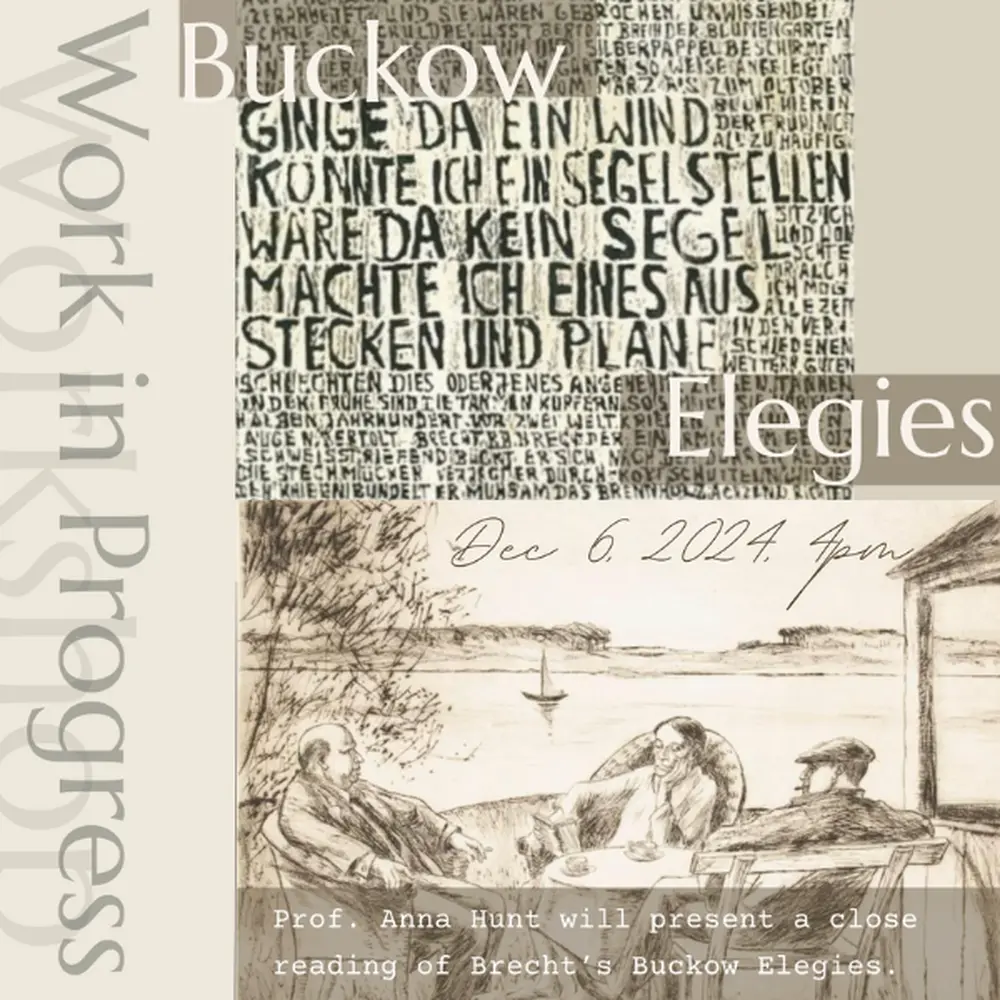
Please join us for the inaugural meeting of the Work-in-Progress Workshop on Dec 6, 2024 at 4pm. This forum is designed to gather members and friends of the Germanic department together to support innovative research and provide a collaborative space to work through new ideas. Grad students and faculty are welcome and encouraged to participate. There is no expected length for materials. Materials will be pre-circulated before the meeting.
On Dec 6, 2024, Prof. Anna Hunt will present a close reading of Brecht’s Buckow Elegies which will form a substantial component of her book and, in the short term, become the kernel of a stand-alone article. She will pre-circulate the work on Dec 2, 2024 — if you are interested in attending please get in touch with Anne Olmstead to be sure you receive the pre-circulated work. Your thoughts, comments, critiques, and suggestions are very welcome. Over the past few years, mourning has taken on more force in Prof. Hunt’s work, which originally focused solely on forgiveness and the erasure of forgiveness in Walter Benjamin’s early writings (from 1921). In turning to the Buckow Elegies and Brecht, Prof. Hunt explores the interaction of forgiveness and mourning for multicultural public spheres.
It is not known how the elegy, which is an ancient form, became associated with mourning. Originally, the elegy, like the sonnet, was a formal descriptor. Over time, however, the content rather than the form has become decisive. Brecht’s cycle plays with this history and, in certain respects, inverts it: Horace intrudes into the content of the verses and the volume of what might be called the “lamentation” is turned down so low it almost retreats into the formal arrangement of the poems.
Prof. Hunt’s reading of the cycle finds buried in it an elegy for Brecht’s lost friend Benjamin – almost as if it is an attempt to carry on a conversation the two began before the war. Benjamin’s name does not appear in the cycle but read alongside Benjamin’s 1921 fragment “On the Meaning of Time in the Moral World,” (the fragment in which Benjamin reimagined God’s Last Judgement as God’s Forgiveness that obliterates the world), the resonance between the elegies and Benjamin’s early musings becomes more legible. At stake in the Buckow Elegies is neither the Last Judgement nor God’s Forgiveness, but perhaps, one of God’s Judgements, or a god’s judgement, or, in any case, a flood. Most critics have read the flood of the Buckow Elegies together with the flood that appears in Brecht’s famous An die Nachgeborenen:
Ihr, die ihr auftauchen werdet aus der Flut
In der wir untergegangen sind
Gedenkt
Wenn ihr von unseren Schwächen sprecht
Auch der finsteren Zeit
Der ihr entronnen seid.
Reading it instead as a conversation with the dead Benjamin offers a different perspective on the elegies. In the elegies, the flood becomes less a fairly straightfoward historical reference to the Nazizeit and more of a complex problem of a catastrophe that may not have changed anything at all.